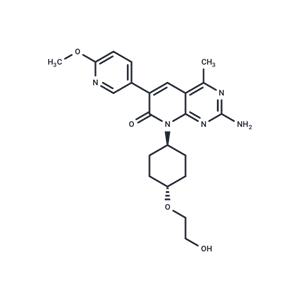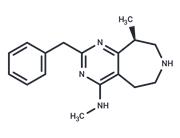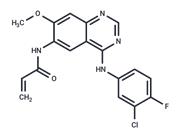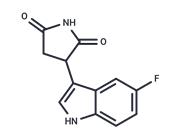| Name | PF-04691502 |
| Description | PF-04691502 is a potent and selective inhibitor of PI3K and mTOR kinases with antitumor activity. |
| Cell Research | BT20, U87 mg, and SKOV3 cells are plated at 3,000 cell/well in 96-well culture plates in growth medium with 10% FBS. Cells are incubated overnight and treated with DMSO (0.1% final) or serial diluted compound for 3 days. Resazurin is added to 0.1 mg/mL. Plates are incubated at 37 °C in 5% CO2 for 3 hours. Fluorescence signals are read as emission at 590 nm after excitation at 530 nm. IC50 values are calculated by plotting fluorescence intensity to drug concentration in nonlinear curve(Only for Reference) |
| Kinase Assay | Kinase Assay: The fluorescence polarization assay for ATP competitive inhibition is done as follows: mPI3Kα dilution solution (90 nM) is prepared in fresh assay buffer (50 mM Hepes pH 7.4, 150 mM NaCl, 5 mM DTT, 0.05% CHAPS) and kept on ice. The enzyme reaction contains 0.5 nM mouse PI3Kα (p110α/p85α complex purified from insect cells), 30 μM PIP2, PF-04691502 (0, 1, 4, and 8 nM), 5 mM MgCl2, and 2-fold serial dilutions of ATP (0–800 μM). Final dimethyl sulfoxide is 2.5%. The reaction is initiated by the addition of ATP and terminated after 30 minutes with 10 mM EDTA. In a detection plate, 15 uL of detector/probe mixture containing 480 nM GST-Grp1PH domain and 12 nM TAMRA tagged fluorescent PIP3 in assay buffer is mixed with 15 uL of kinase reaction mixture. The plate is shaken for 3 minutes, and incubated for 35 to 40 minutes before reading on an LJL Analyst HT. |
| In vitro | PF-04691502 potently inhibits recombinant class I PI3K and mTOR in biochemical assays and suppresses transformation of avian fibroblasts mediated by wild-type PI3K γ, δ, or mutant PI3Kα. In PIK3CA-mutant and PTEN-deleted cancer cell lines, PF-04691502 reduces phosphorylation of AKT T308 and AKT S473 (IC(50) of 7.5-47 nM and 3.8-20 nM, respectively) and inhibits cell proliferation (IC(50) of 179-313 nM). PF-04691502 inhibits mTORC1 activity in cells as measured by PI3K-independent nutrient stimulated assay, with an IC(50) of 32 nM and inhibits the activation of PI3K and mTOR downstream effectors including AKT, FKHRL1, PRAS40, p70S6K, 4EBP1, and S6RP. Short-term exposure to PF-04691502 predominantly inhibits PI3K, whereas mTOR inhibition persists for 24 to 48 hours. PF-04691502 induces cell cycle G(1) arrest, concomitant with upregulation of p27 Kip1 and reduction of Rb. [1] |
| In vivo | Antitumor activity of PF-04691502 is observed in U87 (PTEN null), SKOV3 (PIK3CA mutation), and gefitinib- and erlotinib-resistant non-small cell lung carcinoma xenografts. [1] PF-04691502 inhibits tumor growth at 7 days by 72%. FDG-PET imaging revealed that PF-04691502 reduces glucose metabolism dramatically. Tissue biomarkers of PI3K/mTOR pathway activity, p-AKT (S473), and p-RPS6 (S240/244), are also dramatically inhibited following PF-04691502 treatment. [2] |
| Storage | Powder: -20°C for 3 years | In solvent: -80°C for 1 year | Shipping with blue ice/Shipping at ambient temperature. |
| Solubility Information | DMSO : 61.25 mg/mL (143.96 mM), Sonication is recommended.
Ethanol : < 1 mg/mL (insoluble or slightly soluble)
H2O : < 1 mg/mL (insoluble or slightly soluble)
10% DMSO+40% PEG300+5% Tween 80+45% Saline : 1 mg/mL (2.35 mM), Sonication is recommended.
|
| Keywords | PI3Kδ | PI3Kγ | PI3Kβ | PI3Kα | PI3K | Phosphoinositide 3-kinase | PF-4691502 | PF-04691502 | PF04691502 | PF 4691502 | PF 04691502 | P-Akt (S473) | mTOR | Mammalian target of Rapamycin | Inhibitor | inhibit | Autophagy |
| Inhibitors Related | Stavudine | Aceglutamide | Cysteamine hydrochloride | Sodium 4-phenylbutyrate | Hyaluronic acid | Hydroxychloroquine | Guanidine hydrochloride | Ethyl linoleate | Paeonol | Sodium butanoate | Naringin | Alginic acid |
| Related Compound Libraries | Failed Clinical Trials Compound Library | Bioactive Compound Library | Kinase Inhibitor Library | Anti-Cancer Metabolism Compound Library | Anti-Cancer Clinical Compound Library | Drug Repurposing Compound Library | Inhibitor Library | Immunology/Inflammation Compound Library | Anti-Aging Compound Library | Bioactive Compounds Library Max | Anti-Cancer Drug Library | Anti-Cancer Active Compound Library |

 United States
United States






